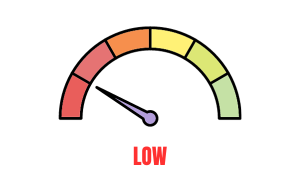A good credit score plays an important role in your financial journey, and in India, it holds significant importance. Whether you’re thinking about buying a house, applying for a credit card, or getting a loan, your credit score is the key to realizing your financial goals. Knowing and improving your credit score isn’t just a smart decision; it’s an essential one. This article will walk you through the basics of credit scoring in India, providing practical advice and tips to help you improve your credit score and unlock better financial opportunities. So, let’s begin this journey to financial empowerment by discovering how to improve your credit score.
Understanding Credit Score
In India, a credit score is like a grade for your financial trustworthiness. It shows how likely you are to pay back the money you borrow. This number is super important for your money life because it decides if you can get loans, credit cards, and other money stuff.
Your credit score comes from places like CIBIL (Credit Information Bureau India Limited) and Experian. They collect your money info and look at your borrowing history. Scores usually go from 300 to 900. The higher your score, the more lenders like you.
Stuff that improve your credit score are: paying dues on time, how much credit you use, how long you’ve been borrowing, what types of money accounts you have, and recent money questions.
Factors Affecting Your Credit Score
In India, your credit score is affected by various factors that demonstrate how trustworthy you are when it comes to borrowing money. It’s important to learn these factors to make sure you maintain and, if needed, improve your credit score. Five main factors can improve your credit score:

Payment History: Making sure you pay your loans and credit card bills on time is vital. Missing payments or paying them late can lower your credit score and harm your chances of improving your credit score.
Credit Utilization Ratio: This ratio shows how much credit you’re using compared to how much you can use. It’s a good idea to keep this ratio low because having high credit usage can negatively affect your credit score. Reducing your credit utilization can be a way to improve your credit score.
Length of Credit History: The longer your credit history, the better. Lenders prefer to see a consistent track record of responsible credit use, which can be a path to improve your credit score.
Types of Credit Accounts: Having a mix of different types of credit, like secured and unsecured loans, can have a positive impact on your credit score, potentially helping you to improve your credit score.
Recent Credit Inquiries: If you apply for loans too often within a short period, it might look like you’re financially unstable, which can lead to a lower credit score. Reducing the number of credit inquiries can be a way to improve your credit score.
Understanding these factors and managing them wisely is important to maintaining a good credit score in India. Being active with your financial responsibilities will ensure that you have a positive credit profile, which can ultimately improve your credit score.
Practical Tips to Improve Your Credit Score
By following these practical tips below, you can work towards improving your credit score, which is vital for securing loans, and credit cards, and achieving your other financial goals.
- Paying bills on time and in full: Timely payment of your credit card bills and loan EMIs is necessary. Late payments can negatively affect your credit score. Set up reminders or auto-debits to ensure you never miss a due date.
- Reducing credit card balances: High credit card balances relative to your credit limit can harm your credit score. Aim to keep your credit utilization ratio below 30%. Paying off outstanding balances is a smart move.
- Avoiding multiple loan applications: Each loan or credit card application triggers a “hard inquiry” on your credit report, which can slightly decrease your score. Apply for credit only when required and avoid multiple inquiries in a short span.
- Diversifying your credit mix: Having a mix of credit types, such as credit cards, personal loans, and retail loans, can positively impact your credit score. It shows responsible credit management.
- Keeping older accounts open: The age of your credit accounts matters. Older accounts with a good history can improve your credit score. Avoid closing them, even if you don’t use them regularly.
Checking and Monitoring Your Credit Score
Maintaining a healthy credit score in India requires regular monitoring and vigilance. Here’s how you can effectively check and manage your credit report:
- How to Obtain Your Credit Report for Free: In India, you have the right to obtain one free credit report annually from each of the major credit bureaus, including CIBIL, Experian, Equifax, and CRIF High Mark. To access your free report, visit their respective websites or use government-approved platforms. Simply provide the required personal information like your PAN Card Number, and your report will be delivered to your registered email address. This is a valuable tool to assess your financial health and identify the areas, that need improvement.
- How Often to Check Your Credit Report: It’s advisable to check your credit report at least once a year to ensure accuracy and track your financial progress. However, for those actively working on their credit, more frequent checks—quarterly or semi-annually—may be beneficial. Regular monitoring allows you to detect any unexpected changes or errors promptly.
- How to Dispute Errors on Your Credit Report: If you spot inaccuracies or errors on your credit report, don’t panic. Contact the credit bureau that issued the report and initiate a dispute. Provide appropriate documentation and a clear explanation of the error. The bureau will analyse your claim and rectify the report if the information is incorrect. Timely correction of errors ensures that your credit score accurately reflects your financial behaviour.
Building Good Credit Habits
Incorporating the below practices into your financial routine can significantly contribute to improving your credit score, ensuring a healthier economic future.
- Budgeting and Financial Planning: One of the basic pillars of holding a healthy credit score is effective budgeting and financial planning. Begin by creating a complete budget that outlines your monthly income and expenses. This allows you to manage your finances efficiently, confirming that you have enough funds to meet your financial responsibilities, such as loan repayments and credit card bills. By attaching to a well-thought-out budget, you can avoid overspending and late payments, both of which can negatively impact your credit score.
- Setting up Payment Reminders: Missing payment due dates can be a major setback for your credit score. To avoid this, consider setting up payment reminders. Many banks and financial institutions offer SMS or email alerts to notify you of upcoming payments. Additionally, you can use smartphone apps and financial management tools to schedule automatic payments, ensuring that your bills are paid on time and your credit score remains unaffected.
- Reducing Unnecessary Expenses: Reducing unnecessary expenses is an important part of improving your credit health. Identify areas where you can cut back on spending, redirecting those funds towards paying off outstanding debts or credit card balances. This not only helps you save money but also prevents you from accumulating more debt, ultimately improving your credit utilization ratio.
- Avoiding Maxing Out Credit Cards: Maxing out your credit cards is a common mistake that can harm your credit score. Try to keep your credit card balances well below their credit limits. Ideally, aim to use no more than 30% of your available credit to maintain a favourable credit utilization ratio. This demonstrates responsible credit usage and positively impacts your creditworthiness.
- Seeking Professional Advice if Needed: If you find yourself in a challenging financial situation or have multiple debts, seeking professional advice can be beneficial. Financial advisors, credit counsellors, or debt consolidation services can help you devise a strategy to manage and reduce your debts effectively. Their expertise can provide you with personalized solutions to address your specific credit-related concerns.
Case Studies or Success Stories
- Case Study 1: Ramesh’s Remarkable Turnaround: Ramesh, a middle-class professional from Mumbai, faced a tough time due to a low credit score. With discipline and commitment, he diligently paid off his outstanding debts and settled old accounts. His credit score gradually improved, allowing him to secure a home loan at a lower interest rate, saving him lakhs in the long run.

- Case Study 2: Priya’s Path to Financial Freedom: Priya, a young entrepreneur from Bengaluru, learned the significance of maintaining a good credit score early in her career. By managing her credit cards responsibly and diversifying her credit mix, she boosted her credit score. This led to better loan offers when she expanded her business, granting her the financial flexibility to achieve her goals and dreams.
These real-life examples illustrate the tangible benefits of improving one’s credit score in India, from securing loans at lower interest rates to achieving financial freedom and realizing long-term financial goals.
Conclusion
In conclusion, we’ve discussed the essential steps to improve your credit score in India. We covered the factors that affect your credit rating, including payment history, credit utilization, credit history length, types of accounts, and recent inquiries. By following practical tips like paying bills on time, reducing credit card balances, and monitoring your credit report, you can improve your financial profile.
Maintaining a healthy credit score in India offers several long-term benefits. It enables you to access better loan terms, lower interest rates, and increased borrowing power. Moreover, a good credit score can open doors to your financial goals, such as buying a home, starting a business, or availing a personal loan. By always practising good credit habits, you’ll be on a path towards financial success and stability.
Frequently Asked Questions (FAQs)
A credit score in India is a numerical representation of an individual’s creditworthiness, which helps lenders assess the risk associated with lending money to them.
You can check your credit score in India through credit bureaus like CIBIL, Experian, and Equifax. You’re entitled to one free credit report per year from each bureau.
Factors like payment history, credit utilization, credit history length, types of accounts, and recent inquiries impact your credit score.
It’s advisable to check your credit report at least once a year to monitor your financial health and address any errors.
A good credit score in India can lead to better loan terms, lower interest rates, and greater access to financial opportunities, such as home loans, business financing, and personal loans.
Yes, you can improve your credit score by paying bills on time, reducing credit card balances, and adopting good credit habits.
Yes, there are credit counselling and financial advisory services available that can provide guidance on credit score improvement.
If you have no credit history, consider starting with a secured credit card or by becoming an authorized user on someone else’s credit account to begin building your credit profile.



